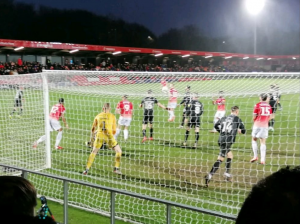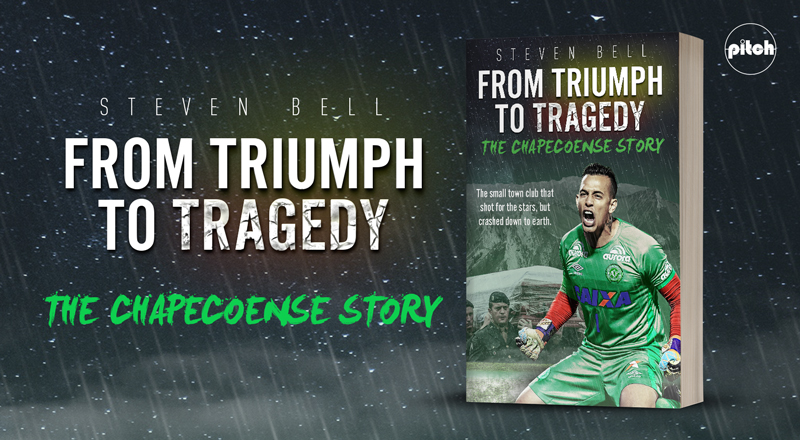2019/20: An Incredible Journey. Match Day 18 – Saturday 11 January 2020: Salford City v Northampton Town

A New Year and 71 days since my last game. I’d had quite a dip in mood due to a number of issues that were going on in my personal life.
I think I am a strong person, I’m 57 years old, I have been employed all my life since leaving school in 1981, I have had a mostly comfortable life financially, strangely I find myself in a similar financial position now that I did when I was 21, but that’s a whole other story. I have lots of close friends and a wonderful family, I have been healthy all my life, with the exception of sporting injuries, I was still playing football up to the lockdown.
So why would I suddenly go from being primarily happy to become so sad that I was contemplating suicide at Newark Railway station in the space of six months? That was four years ago, and I had a complete breakdown and was under the care of a psychiatrist and diagnosed as suffering from severe depression and started on a course of anti-depressants. Shortly afterwards I had a further severe dip in mood and took myself to Leeds General Infirmary as I was feeling a danger to my welfare. I never made it to the hospital, instead I walked for miles along the canal and railway line, for some reason I have a fascination with trains when I am feeling suicidal, contemplating which would be the best way to go – instantly being hit by a train, or slowly drowning. I’d heard that drowning was a calming experience once the panic was over. Also it would affect very few people, possibly the person that found me. If I got hit by a train, I knew it would pretty certain to be over, but what about the trauma it would cause the driver? So I walked and walked from Leeds City Centre to Shipley Railway station, around 18 or 19 miles, and then caught the train home to Guiseley. I’d left the house around 6am, returned home at around 3.30 pm, my ex-wife got in at around 4:30 pm. Do you know, not once did she try to contact me at any time from waking to find me not in the house to returning home at 4.30pm.
I’ve analysed a lot in the past ten years and fortunately haven’t dipped as low as that again for a long time. But at the back end of 2019 something had caused me to go into a funk, and not the James Brown type of funk either. However, the New Year was a fresh start, so I began my football journey again with added verve.
Salford City were the team I had chosen to restart my journey. A fairly new team to the higher echelons of football pyramid, with 2019/20 being their first in the Football League. They are probably best known for their takeover in 2014 by some of the ‘Class of ‘92’ from Manchester United – Ryan Giggs, the Neville Brothers – Phil and Gary, Paul Scholes and Nicky Butt, with David Beckham taking a stake in the club in January 2019. The Club also featured in a BBC documentary series, Class of 92: Out of their League which ran for two series. However, an abiding memory of one of the Class of ‘92 is Dennis Wise getting Nicky Butt sent off by pinching the hairs on his legs. I still find it funny to this day!
Following the takeover Salford had a meteoric rise to League Two, which saw them climb from playing in the Northern Premier League Division One North in 2014/15 to the Football League in just five years. Moor Lane has been their home ground since 1978 and is unrecognisable from those days having been substantially redeveloped and is now known as the Peninsular Stadium. Northampton Town were the visitors for my first game of 2020.

Like my visit to York, the weather was not at its best and there were some sustained periods of torrential rain during the game. So to a brief summary of the match. The Ammies went ahead after twenty minutes when Jack Baldwin, on-loan from Sunderland, headed home Craig Conway’s corner to put Salford one-up. The lead though lasted just nine minutes, when The Cobblers levelled. Salford failed to clear the ball properly and Northampton swept the play from left to right via Nicky Adams to Sam Hoskins, who arrowed a great shot into the corner – it had a touch of the Carlos Alberto about it (circa 1970 World Cup Final – the fourth Brazil goal). Half-time, all square 1-1.
Northampton started the second-half brightly and had a couple of decent chances with Vadaine Oliver hitting the side netting, before Andy Williams went round Salford ‘keeper Kyle Letheren but was forced wide and was unable to get a shot in. Williams though made up for that just after the hour mark. The Cobblers broke from half-way and after Salford couldn’t clear the cross, the rebound dropped to Williams who volleyed it home much to the delight of the travelling Northampton fans behind the goal. Salford battled for an equaliser and created a good chance after some patient build-up with Thomas-Assante slicing the chance wide from the left edge of the six-yard box. Substitute Hunter then nearly made a name for himself as his cross caused chaos in the Town box, with ‘keeper Cornell grateful to cling on to the loose ball. He then had another effort as his curling cross was just kept out by Cornell as fellow substitute Adam Rooney just failed to get a touch that would have surely brought an equaliser. However, The Cobblers held on for a 2-1 win and three points in their promotion push.
Saturday 11 January 2020
Sky Bet League Two
Salford City 1 (Baldwin 20’) Northampton Town 2 (Hoskins 29’, Williams 63’)
Venue: Peninsular Stadium
Attendance: 2,919
Salford City: Letheren, Wiseman (Pond 86’), Hughes, Burgess, Touray, Jervis, Baldwin, Towell, Conway (Hunter 70’), Thomas-Assante, Armstrong (Rooney 70’).
Unused Substitutes: Neal, Hogan, Lloyd-McGoldrick, Doyle.
Northampton Town: Cornell, Goode, Wharton, Turnbull, Hoskins, Lines, Watson, Adams (Harriman 87’), Anderson (Warburton 77’), Williams (Roberts 90+4), Oliver
Unused Substitutes: Hall-Johnson, Pollock, Martin, Arnold.
Steve Blighton
